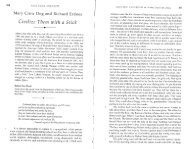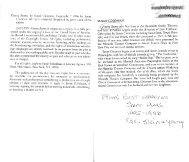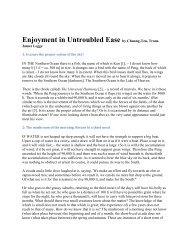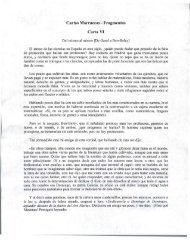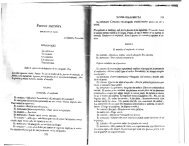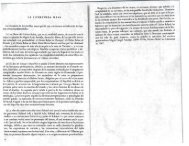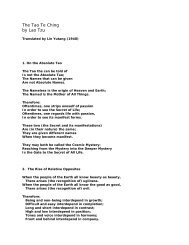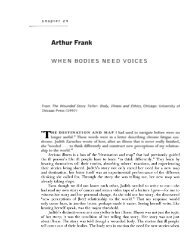Anne Hutchinson and the Puritan Attitude toward Women Author(s ...
Anne Hutchinson and the Puritan Attitude toward Women Author(s ...
Anne Hutchinson and the Puritan Attitude toward Women Author(s ...
Create successful ePaper yourself
Turn your PDF publications into a flip-book with our unique Google optimized e-Paper software.
was a woman. "It was an age in which <strong>the</strong> human intel-<br />
lect, newly emancipated, had taken a more active <strong>and</strong><br />
a wider range than for many centuries. Men of <strong>the</strong><br />
sword had overthrown nobles <strong>and</strong> kings. Men bolder<br />
than <strong>the</strong>se had overthrown <strong>and</strong> rearranged--not actually,<br />
but within <strong>the</strong> sphere of <strong>the</strong>ory, which was <strong>the</strong>ir most<br />
real abode--<strong>the</strong> whole system of ancient prejudice,<br />
wherewith was linked much of ancient principle. Hester<br />
Prynne imbibed this spirit. She assumed a freedom<br />
of speculation, <strong>the</strong>n common enough on <strong>the</strong> o<strong>the</strong>r side<br />
of <strong>the</strong> Atlantic, but which our forefa<strong>the</strong>rs had <strong>the</strong>y<br />
known it, would have held to be a deadlier crime than<br />
that stigmatized by <strong>the</strong> scarlet letter."45<br />
The first generation of settlers, said Hawthorne,<br />
were "in <strong>the</strong> first stages of joyless deportment, <strong>and</strong><br />
<strong>the</strong> offspring of sires who had known how to be merry....<br />
Their immediate posterity, <strong>the</strong> generation next to <strong>the</strong><br />
early emigrants, were <strong>the</strong> blackest shade of <strong>Puritan</strong>,<br />
<strong>and</strong> so darkened <strong>the</strong> natural visage with it,that all <strong>the</strong><br />
subsequent years have not sufficed to clear it up." Like<br />
<strong>the</strong> Reverend John Cotton, Hawthorne's Arthur Dimmesdale<br />
at first was able to mediate between <strong>the</strong> grim male soldier-<br />
magistrates on <strong>the</strong> one side, <strong>and</strong> what Hawthorne presented<br />
as <strong>the</strong> antique gentility, <strong>the</strong> softness, beauty, complex-<br />
ity <strong>and</strong> fallibility of a maternal woman on <strong>the</strong> o<strong>the</strong>r.<br />
But Prynne's banishment represented <strong>the</strong> exclusion of all<br />
of those qualities from a place of value in <strong>the</strong> American<br />
character. Hawthorne described Prynne "banished, <strong>and</strong><br />
as much alone as if she inhabited ano<strong>the</strong>r sphere, or<br />
communicated with <strong>the</strong> common nature by o<strong>the</strong>r organs <strong>and</strong><br />
senses than <strong>the</strong> rest of human kind." He said <strong>the</strong> activ-<br />
ity--needlework--which her exclusion from o<strong>the</strong>r forms<br />
of expression forced upon Prynne, was characteristic of<br />
women generally in <strong>the</strong> middle of <strong>the</strong> nineteenth century,<br />
as well as in <strong>the</strong> first generation of settlement. "She<br />
had in her nature a rich, voluptuous, Oriental charac-<br />
teristic--a taste for <strong>the</strong> gorgeously beautiful, which,<br />
save in <strong>the</strong> exquisite productions of her needle, found<br />
nothing else in all <strong>the</strong> possibilities of her life to<br />
exercise itself upon. <strong>Women</strong> derive pleasure, incom-<br />
prehensible to <strong>the</strong> o<strong>the</strong>r sex, from <strong>the</strong> delicate toil of<br />
<strong>the</strong> needle. To Prynne it might have been a mode of<br />
expressing, <strong>and</strong> <strong>the</strong>refore soothing, <strong>the</strong> passion of her<br />
life. Like all o<strong>the</strong>r joys, she rejected it as a sin."<br />
So Prynne's "o<strong>the</strong>r organs <strong>and</strong> senses" were her female<br />
ones (<strong>and</strong> <strong>the</strong>ir presumed psychological correlatives),<br />
89



